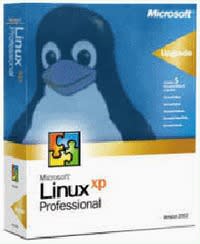The open-sourcing of Microsoft
When Ed Bott recently wrote about how Microsoft really is taking a new path he mentioned many important points, but I think he missed perhaps the most important technical point of all: Microsoft is finally really embracing open-source software.
Over the years Microsoft has, despite fighting with Linux and other open-source programs, never actually shied away from using open-source software when it was to the company's advanage. They just never talked about it.

OK, so MS-Linux probably isn't in the cards, but Microsoft really is getting into supporting both Linux and open-source software.
For example, Windows first use of TCP/IP in NT 3.5x and Microsoft's initial releases of HotMail were both based on FreeBSD. Most of the time, however, Microsoft's public attitude could be summed up by Steve Ballmer infamous 2001 quote that "Linux is a cancer."
That was then. This is now.
Today, Microsoft CEO Satya Nadella says that "Microsoft loves Linux."
This wasn't a sudden change that only happened because Ballmer was finally shown the door. No, this change has been coming for years.
In 2008, Sam Ramji, then Microsoft's director of platform technology strategy, said "The Microsoft open-source strategy is focused on helping customers and partners be successful in today's heterogeneous technology world." In 2011, Microsoft saw that the cloud was going to be built largely on Linux and they were a top Linux contributor.
Microsoft foresaw the future correctly. The reason why Nadella "loves Linux" is that 20 percent of the operating systems running on Microsoft's Azure cloud are Linux variations. I wouldn't be surprised in the least if in the the next few months Microsoft announces it will support Red Hat Enterprise Linux (RHEL) on Azure.
The real change though isn't just that Microsoft is using Linux and open source to promote its own programs. No, it's that Microsoft is actively supporting open-source projects that compete with its own programs and is open-sourcing some of its own code.
For example, Microsoft has partnered with Canonical, Ubuntu Linux's parent company, to bring Windows Server to OpenStack, an Azure competitor. This would never have happened under Ballmer's or Gate's regime.
And, perhaps most amazing of all, Microsoft is planning to open-source its full server-side .NET core stack and port it to Linux and Mac OS X.
What's hot on ZDNet
Now this — this is amazing. We've always known .NET could run on Linux. Miguel de Icaza, founder of the GNOME Linux desktop interface, has spent years bringing .NET to Linux under the Mono project. Indeed, de Icaza is now one of the members of the Microsoft sponsored open-source .NET Foundation.
That's not to say that Mono and the Microsoft's new open-source .NET will merge. As de Icaza explained in an interview, "The full .NET Framework is bundled with Windows so it has a fairly high set of requirements for backwards compatibility. So they’re not going to be taking patches or engaging the community on that one. We will use this to improve Mono, but it’s a read-only approach".
Now, true cynics are already saying things like, "Microsoft is just doing this to once more 'Embrace, extend—and extinguish'" its enemies.
You don't get much more cynical than I do when it comes to Microsoft, but I don't think that's what Microsoft is doing this time.
The Microsoft of 2014 is not the Evil Empire of the 90s and 2000s. This Microsoft can no longer dictate its terms to end-users. Look closely at what Microsoft is doing.
Not only is it working with open-source projects and open-sourcing its own code, it's bringing its flagship programs, such as Office, under the Office 365 guise to iPhones and iPads and Android tablets.
Today's Microsoft is a company that realizes it needs to work with its rivals rather than try to bury them. No, I'm not making a joke. I really believe that Microsoft is reinventing itself.
Now, whether this open-source friendly reinvention will be successful is another question. That said, I think this new path is much more likely to be successful than trying to hold on to its old monopolistic ways. Those days are done. We'll see how these new days work out.
Related Stories:

